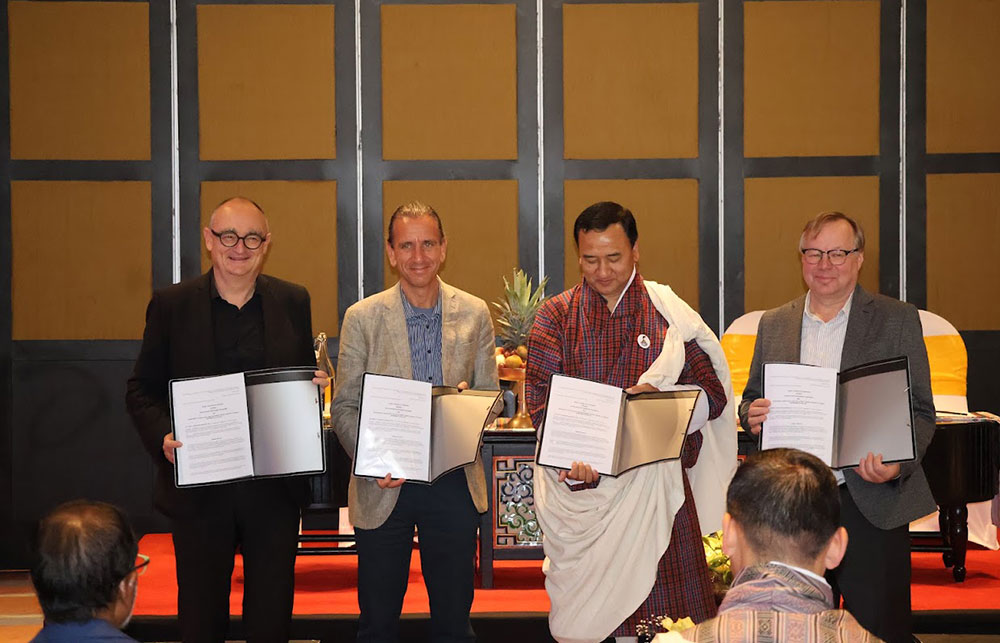Bhutan secures USD 4.6 million for climate resilience project
YK Poudel and Jigme Gaysel
To strengthen the provision of high-quality weather forecasts, early warning systems and climate services through resilient development, and climate adaptation actions, Bhutan will receive a funding assistance of USD 4.6 million.
This was shared during the “Regional Systematic Observations Financing Facility (SOFF) Workshop in South Asia” which started yesterday.
The workshop which ends on September 26, is organized by the National Centre for Hydrology and Meteorology (NCHM), in collaboration with the World Meteorological Organization (WMO) attended by Secretary of the Ministry of Energy and Natural Resources (MoENR), officials from the WMO SOFF Secretariat the Director General of National Meteorological and Hydrological Services of Nepal, Maldives, and Bangladesh, who are also SOFF funding recipient countries in South Asia.
The Bhutan SOFF investment project was approved by the SOFF Secretariat in March this year.
Karma Tshering, secretary of MoENR, said that the 13th Plan of the government aims to enhance the economic growth in the country to achieve investment in crucial sectors for which the role of NCHM is pivotal.
“Climate resilient development is a priority in the country to ensure disaster risk reduction, for which, timely data is important for sectors such as hydropower, agriculture aviation and health-care among others,” he said.
The country, he said, had developed a Roadmap for 2024 and 2034 that aims to balance between development and resilience in the phase of changing climate, proven by the high rate of retreating glaciers and associated risks.
Markus Repnik, the director of SOFF Secretariat, WMO, said that the Secretariat would continue supporting the country even after the end of this project.
SOFF was established with the objective of providing grant financing and technical assistance to the Small Island Developing States and Least Developed Countries, he said, to sustain the collection and exchange of essential surface-based weather and climate observations.
“Among 193 member countries, the SOFF projects in the South Asian region are at the forefront of its implementation with about two billion population, a part of this initiative,” he said.
The SOFF was established by WMO, UNDP, and UNEP in 2021 at the 26th Session of the Conference of the Parties to the United Nations Framework Convention on Climate Change. SOFF is a United Nations Multi-Partner Trust Fund and the Secretariat is located with WMO in Geneva, Switzerland.
Bhutan’s National Adaptation Plan 2023 identifies a range of priority climate adaptation and resilience activities related to strengthening capacity of hydro meteorological service, expanding and improving hydrometeorological stations network, developing efficient database and information dissemination system, enhancing weather forecasts and early warning systems among others.
Karma Dupchu, the director of NCHM, said that there was a need for investment towards the nation’s weather and climate data systems, as the nation faces an increased number of natural disasters, including glacial lake outburst floods and extreme weather events.
This project aims to support Bhutan in achieving its strategic climate adaptation and resilience goals, he said, through strengthening its technical institutional and human capacity for basic weather and climate observations. “It will be carried out in line with the Global Basic Observing Network regulations, weather predictions and supporting the multi-hazard early warning systems.”
As per the project implementation document, the NCHM is the national executing entity while the UNEP will be the implementing entity for this project with responsibilities of its implementation, financial assistance, evaluation and reporting of the project.
The project will also engage Civil Society Organisations and other agencies in the country for its implementation.
The funds will be received in three tranches between 2024 and May 2029, accounting for USD 4,598,124.
As per the workplan, the project will establish an upper air observation system, WMO-certified Automatic Weather Stations (AWS), calibration facilities, and related capacity building during the 13th Plan. Moreover, programmes and initiatives such as human capacity development, structural development and data management systems enhancement are a part of the project.


